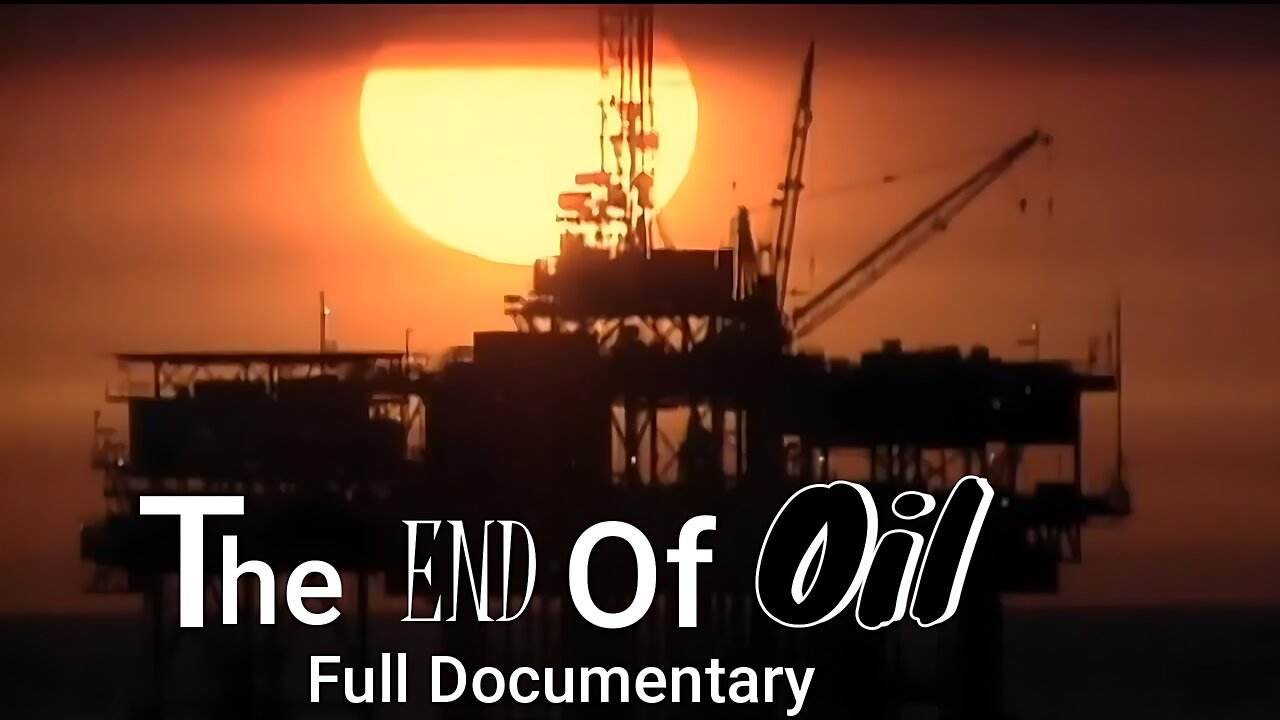Premium Only Content

The End of Oil National Geographic Documentary
Premiered Dec 28, 2020 #peakoil
💥NEW CHANNEL PLEASE FOLLOW 💥
Peak oil is the year when the maximum rate of extraction of petroleum is reached, after which it is expected to enter terminal decline. As of 2020, peak oil forecasts range from 2019 to the 2040s, depending on economics and how governments respond to global warming. It is often confused with oil depletion; however, whereas depletion refers to a period of falling reserves and supply, peak oil refers to the point of maximum production. The concept of peak oil is often credited to geologist M. King Hubbert whose 1956 paper first presented a formal theory. Peak coal was in 2013 and peak oil is forecast to occur before peak gas.
Most early analyses concentrated on increasing costs of extraction and assumed that demand would drive costs higher. More recent analyses concentrate on drop in demand as alternatives to oil become more attractive.
Some observers, such as petroleum industry experts Kenneth S. Deffeyes and Matthew Simmons, predicted there would be negative global economy effects after a post-peak production decline and subsequent oil price increase because of the continued dependence of most modern industrial transport, agricultural, and industrial systems on the low cost and high availability of oil.
According to the International Energy Agency, conventional crude oil production peaked in 2006. A 2013 study concluded that peak oil "appears probable before 2030", and that there was a "significant risk" that it would occur before 2020, and assumed that major investments in alternatives will occur before a crisis, without requiring major changes in the lifestyle of heavily oil-consuming nations. Predictions of future oil production made in 2007 and 2009 stated either that the peak had already occurred, that oil production was on the cusp of the peak, or that it would occur soon. These predictions proved false as world oil production rose and hit a new high in 2018 although most of this increase in supply in the United States comes from deposits of tight oil, which is costlier to extract than conventional oil and requires substantial capital for investment.
Hubbert's original prediction that US peak oil would occur in about 1970 appeared accurate for a time, as US average annual production peaked in 1970 at 9.6 million barrels per day and mostly declined for more than three decades after. However, the use of hydraulic fracturing and horizontal drilling caused US production to rebound starting around 2005. In addition, Hubbert's original predictions for world peak oil production proved premature. The rate of discovery of new petroleum deposits peaked worldwide during the 1960s and has not approached these levels since.
End of Oil Documentary is the story when there will be no oil on earth anymore. Globally, we currently consume the equivalent of over 11 billion tonnes of oil from fossil fuels every year. Crude oil reserves are vanishing at a rate of more than 4 billion tonnes a year – so if we carry on as we are, our known oil deposits could run out in just over 53 years.
Tags:
Documentary
Documentaries
Documentary 2020
discovery
watch hd documentary 2020
best documentaries
full episode documentary
documentary channel
documentary netflix
documentary hd
animals
animals documentary
Wildlife
Wildlife Documentary 2020 HD
Wildlife Documentary
National Geographic
Wild
Animals Attacks
Wildlife Animals
Contact us : Nationalgeoinvestigation@gmail.com
Like and Subscribe for More Videos
Лицензия Creative Commons
Произведение «The End of Oil National Geographic Documentary 2020 HD» созданное автором по имени Ol.novvosad@gmail.com, публикуется на условиях лицензии Creative Commons «Attribution» («Атрибуция») 4.0 Всемирная.
https://creativecommons.org/licenses/by/4.0/
-
 5:17
5:17
Mrgunsngear
1 day ago $7.62 earnedPresident Trump Has Appointed A New ATF Director
42.8K32 -
 48:17
48:17
Athlete & Artist Show
8 days ago $3.18 earnedS5E1: Chucky Announces First Kid, 4 Nations Face Off, and more!
54.2K2 -
 38:30
38:30
hickok45
10 hours agoSunday Shoot-a-Round # 269
72.1K18 -
 1:39:55
1:39:55
Squaring The Circle, A Randall Carlson Podcast
1 day ago#040 Humanity's Expansion Into The Cosmos: A New Age - Squaring The Circle
41.8K5 -
 12:54
12:54
ariellescarcella
19 hours agoYou're NOT Queer, Just Annoying And Boring
29.3K20 -
 18:57
18:57
Fit'n Fire
15 hours ago $1.57 earnedA PDW That Thumps -- Stribog SP45A3 45ACP
28.5K2 -
 2:06:23
2:06:23
Game On!
19 hours ago $2.18 earnedAnother Sunday Without Football...
35.3K3 -
 17:53
17:53
Forrest Galante
20 hours agoHow I Joined a Dangerous Remote Tribe (feat. Nelk Boys)
89K15 -
 18:12:15
18:12:15
Vocalot
1 day agoDay 6! New Here! New Rumble Friends!? 🤙
103K9 -
 34:27
34:27
The Connect: With Johnny Mitchell
1 day ago $18.79 earnedCan He Stop Them? Inside Trumps War On Mexican Drug Cartels & The New Era Of Mexican Organized Crime
56.5K27